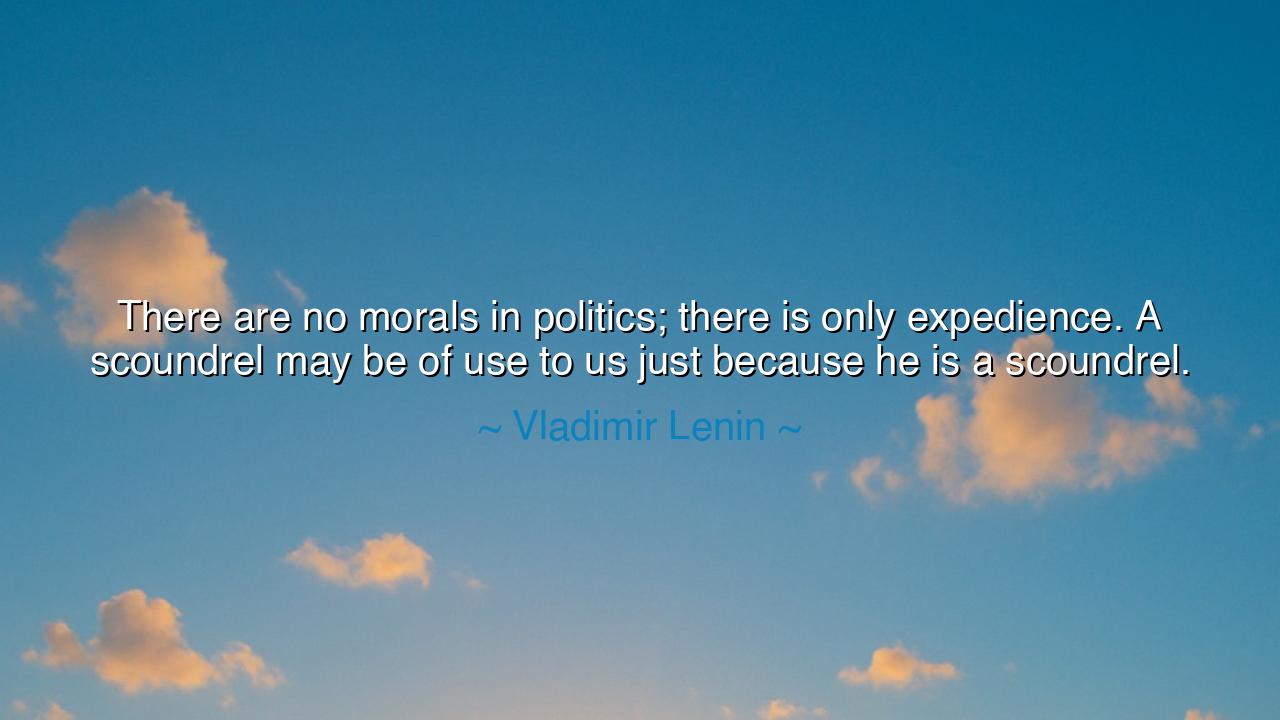
There are no morals in politics; there is only expedience. A
There are no morals in politics; there is only expedience. A scoundrel may be of use to us just because he is a scoundrel.






O children of the future, hear the words of Vladimir Lenin, a man whose vision of politics was as cold and calculating as it was radical. "There are no morals in politics; there is only expedience. A scoundrel may be of use to us just because he is a scoundrel." In these words, Lenin unveils a hard truth: that politics is not a realm of high ideals or moral purity, but a battlefield where the ends justify the means. The scoundrel, who in another context would be condemned for his actions, may find himself an ally in the political arena simply because his self-interest aligns with the goals of the powerful. Lenin speaks of the amoral nature of political power, where the pursuit of control and victory often trumps notions of right and wrong.
In the ancient world, this idea was not foreign to the great leaders who understood the harsh realities of ruling. Cicero, the famed Roman orator, often spoke of the moral corruption that plagued the Senate, where the pursuit of power often led men to act against their own principles. Yet, despite his lofty ideals, Cicero knew that politics required compromises, and that to achieve the greater good, sometimes one must engage with forces and individuals whose morality was questionable. Lenin’s words echo this understanding—that politics demands that rulers work with whatever tools are at their disposal, even if those tools are tainted by corruption.
Consider the example of Julius Caesar, who, in his quest for power, allied himself with men of questionable character—Crassus, a wealthy and unscrupulous businessman, and Pompey, a general whose ambition often led him to questionable acts. Caesar’s rise to power was marked by his willingness to form alliances with men who, though morally compromised, helped him achieve his goal of ruling Rome. Like Lenin, Caesar knew that in the world of politics, expedience and the pursuit of power often required forming alliances with those who could further one’s aims, regardless of their personal integrity. In Caesar’s case, the scoundrels became instrumental in his victory.
In more modern times, the story of Franklin D. Roosevelt during World War II offers a more recent reflection of Lenin's pragmatic approach to politics. Roosevelt, in his efforts to guide the United States through the turmoil of the war, often worked alongside leaders whose actions were less than virtuous—such as Stalin, the leader of the Soviet Union. Despite Stalin's brutal regime, Roosevelt recognized that defeating Nazi Germany required an alliance with the Soviet Union, even though it meant aligning with a scoundrel. This expedient decision was not based on moral alignment, but on the necessity of securing a common goal—victory in the war. In this sense, Roosevelt's alliance with Stalin mirrors Lenin's belief that morality is often secondary to expedience in the world of politics.
O children, let the words of Lenin guide you as you navigate the complexities of power and politics. The world of leadership is not one of clear-cut morality, but one of compromise, strategic alliances, and the pursuit of goals that may require difficult and uncomfortable choices. Just as Caesar, Roosevelt, and even Cicero understood, the path to power is rarely pure, and often requires engaging with those whose morals are far from ideal. Yet, remember that the true test of leadership lies not in the choices made in the comfort of idealism, but in the ability to achieve victory in the face of harsh realities.






TT32-Dao Thi Thanh Thao
Lenin’s idea that a scoundrel could be useful in politics because of their nature brings up a critical question about the nature of power. It’s unsettling to think that someone’s lack of ethics could be seen as a strength in political maneuvers. How does this perspective impact the public’s trust in the political system? Can we ever expect genuine leaders when the system rewards such expedience over integrity?
DSMac Duy Sang
This quote by Lenin is rather harsh, suggesting that the ends justify the means. It makes me question how much we can trust political figures when they view others simply as tools to be used. Does this lack of morality mean that political success is always at the cost of ethical behavior? Or is it a necessary compromise in a world full of power struggles and opposing interests?
LGLong Gia
The idea that there are no morals in politics and that expedience is key seems to paint politics as a game of survival rather than a field for ethical leadership. Lenin's words make me wonder: when politicians act in such a way, what does that say about their responsibility to the people they serve? Can we truly separate morality from the impact their decisions have on society?
ANvan anh nguyen
Lenin’s view on politics is pretty cynical but might be accurate in some situations. The idea that morals are secondary to expedience in political decisions seems to reflect the realpolitik approach. Do you think this is an inevitable truth in politics, or do we ever see genuine moral considerations driving political action? Could a political system be truly moral, or is it always about what works in the moment?